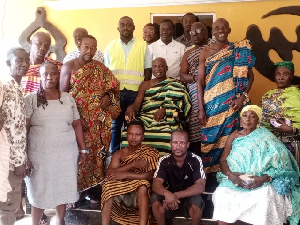There are a total of 15,063 prisoners at the end of September 2018 against authorised capacity of 9,875 of all prisons in the country, with a corresponding general overcrowding rate of 52.5 per cent, Ghana Prisons Service revealed in Accra.
According to the Ghana Prison Service, isolated rates in walled prisons holding medium to high risk prisoners, range from 100 to 400 per cent, which is affecting quality of service delivery in terms of food, healthcare, bedding, sanitation, education and life skills.
Mr Patrick Darko Missah, Director-General, Ghana Prisons Service stated in a speech read on his behalf at a workshop to sensitize senior Police and Prison Officers on the guidelines on the Conditions of Arrest, Police Custody and Pre-Trail Detention in Africa (Luanda Guidelines).
The workshop organised by the Commission on Human Rights and Administrative Justice (CHRAJ) in partnership with the African Commission on Human and People’s Rights (ACHPR) and the African Policing Civilian Oversight Forum (APCOF).
Mr Missah noted that, though the service over the years had strived to ensure that the rights of prisoners, including pre-trial detainees are observed, it had been hindered by factors such as overcrowding, budgetary and logistical constraints as well as the slow pace of investigations and prosecution, leading to prolong stay in pre-trail detention.
He noted however that, relevant stakeholders within the criminal justice system have initiated interventions to mitigate the challenges affecting the rights of pre-trail detainees.
He identified some of the interventions as ‘Justice For All,’ which has drastically reduced the pre-trail (remand) population from 30 per cent at its inception in 2007 to 13 per cent in 2018, thereby ensuring the expeditious disposal of prolonged pre-trail cases.
Mr Missah also recounted the landmark ruling by the Supreme Court in 2016, which made non-bailable offences like, murder, rape, defilement, and possession of narcotics now bailable offences, which has contributed to further reduction in remand population.
He said the setting up of paralegal unites in all prisons to aid access to the courts by the prisoners, and the case tracking system, all aimed at reducing and eradicating the incidence of pre-trail detainees with expired warrants in prisons.
The Director General of Prisons said the service will hasten to incorporate the relevant topics of the workshop into the human rights training curriculum to augment training on national human rights laws and international instruments relating to the treatment of prisoners.
Mr Richard Quayson, Deputy Commissioner of CHRAJ explained that Ghana as a member of the comity of nations and signatory to various international laws and treaties, has to ensure that its practices relating to crime fighting and law enforcement conform to, not only its own domestic standards, but also to universally accepted standards.
He noted however that, law enforcement institutions continue to face difficulties complying with both domestic and international standards, “it is against this background that a baseline study was conducted in 2014 in relation to arrest and pre-custody.
He said the study established a number of challenges that bedevil the criminal justice system in the country, which included arbitrary arrest, overcrowding in prisons, and other practices and conditions that affect the dignity of persons in custody.
Mr Quayson said Ghana has started the process of promoting the implementation of the Luanda Guidelines.
The security officers would also be schooled on the Guidelines on Sexual Violence and its consequences, especially in relation to persons in detention centres and prisons.
The Luanda Guidelines were adopted by the ACHPR during its 55th Ordinary Session in Luanda, Angola, in May 2014. Article 2, 3, 5, 6, 7 and 26 of the African Charter on Human and Peoples’ Rights (the African Charter) set out States’ obligations to provide all people with the rights to life, dignity, equality, security, a fair trial, and an independent judiciary.
The Luanda Guidelines, sought to assist States in implementing these obligations in the specific context of Arrest, Police Custody and Pre-Trial Detention.
The African Commission is mandated to formulate standards, principles and rules on which African Governments can base their legislation. It is on this basis that these Guidelines have been developed.
The adoption of the Luanda Guidelines was an important step towards promoting a rights-based approach to decisions to arrest and detain suspects, and to conditions and safeguards with respect to police custody and pre-trial detention.
The Guidelines reflect the collective aspirations of States, National Human Rights Institutions and Civil Society Organisations in promoting a rights-based approach to this critical area of criminal justice.
The Luanda Guidelines have been subject to extensive consultations and expert review by State Parties to the African Charter, National Human Rights Institutions, and Civil Society Organisations across Africa.
General News of Wednesday, 3 October 2018
Source: ghananewsagency.org













